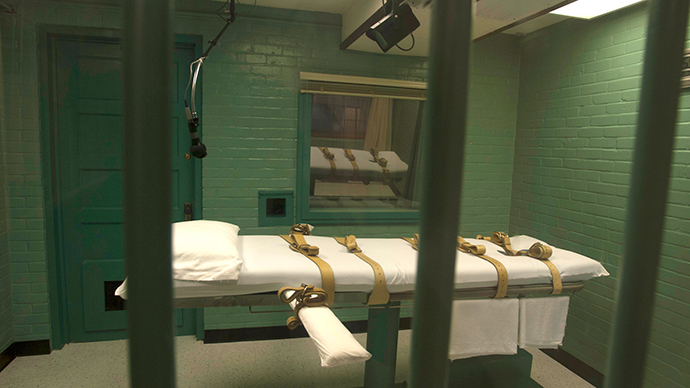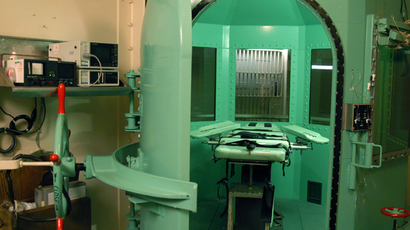Global execution rate jumps by nearly 15% in 2013

Overall 778 executions have been recorded in 2013 worldwide, an increase of almost 15 percent on the previous year, with China, Iraq, Iran, Saudi Arabia and the USA topping the list, says an annual Amnesty International report.
At least 22 countries were responsible for applying the death penalty, says the London-based rights organization that considers the abolition of capital punishment a top priority. However, the number of countries which use the death penalty has markedly reduced in the last 20 years, with at least 47 countries practicing it back in 1994.
Meanwhile, almost 80 percent of all known executions worldwide were recorded in Iran, Iraq and Saudi Arabia. Iraq put at least 169 people to death, a jump of almost 30 percent on 2012, while in Iran there were at least 369 officially acknowledged executions, says the report.
“The virtual killing sprees we saw in countries like Iran and Iraq were shameful,” said Salil Shetty, Amnesty International’s Secretary General, ”But those states who cling to the death penalty are on the wrong side of history and are, in fact, growing more and more isolated.”
The USA took the fifth place and remained the only country in the Americas to carry out executions in 2013.
“Last year 39 executions were carried out in nine states [of the USA], 82 percent of which were in the Southern states, with Texas alone accounting for 41 percent of all executions, an increase from 34 percent in 2012,” says the report.
Thirty-two US states currently allow capital punishment. Texas, Virginia, Oklahoma, Florida, and Missouri, Alabama and Georgia have put the most people to death.
In addition, the USA and Japan have been the only countries in the G8 which have carried out executions in 2013.
According to the data, Europe and northern Central Asia became “execution-free zones”, where no case of capital punishment has been reported since 2009, says the report.
Overall 32 countries signed pardons on death sentences, including Afghanistan, India, Indonesia, Iran, Japan, Saudi Arabia, South Korea, the United Arab Emirates (UAE) and USA, while six countries exonerated convicts: Afghanistan, Bangladesh, Egypt, India, the UAE and USA.
At least 1,925 people were known to have been sentenced to death in 57 countries and at least 23,392 people were under sentence of death worldwide at the end of 2013, says the report.
Meanwhile, many of those states which retain the death penalty continue to violate international standards throughout the world.
“Grossly unfair trials and the execution of people who were under the age of 18 at the time they allegedly committed the crime were again reported in 2013,” says the organization, adding that at least three people under 18 were executed in Saudi Arabia.
The data doesn’t include thousands of people put to death in China, where capital punishment is treated as a state secret, says the report. The Foreign Ministry referred a question about its executions last year to the Justice Ministry, which never responded.
“China continued to execute more people than the rest of the world put together,” adds the report.
Amnesty international, however, didn’t confirm the number of executions in conflict-torn Syria or Egypt.
Also the Amnesty International highlights the secrecy that surrounds the use of the death penalty in many countries.
Neither prisoners nor their families were informed of their execution in India, Indonesia, Japan, Malaysia, South Sudan and in Iran, while in Botswana, India, Nigeria and Saudi Arabia the bodies of some executed were not returned to their families for burial, the locations of their graves were not known.
“Numerous governments continue to ignore international legal standards that require family members and lawyers to be notified about executions in advance,” adds Amnesty International.
Some countries apply capital punishment to people whose offences “don’t meet the threshold of most serious crimes.”
Why people are executed
In China, Iran, Pakistan, Saudi Arabia and the UAE drug-related activities saw capital punishment applied. Saudi Arabia also executed people for adultery and those accused of blasphemy were executed in Pakistan.
‘Treason’, ‘acts against national security’ and ‘collaboration’ with a foreign entity were punished with death sentences in Lebanon, North Korea and the Palestinian Authority. One of the most notorious executions for state treason took place in North Korea when the country’s controversial leader Kim Jong-un ordered capital punishment for his uncle, Jang Song-thaek.
Amnesty International also provided the data of the methods of executions. Hanging was used in 13 countries, including Japan and India. The USA used lethal injection and electrocution to execute convicts. Public executions were carried out in four countries - Iran, North Korea, Saudi Arabia and Somalia.
The report comes right after the stunning decision of Egypt’s court to issue death penalty to 529 supporters of the Muslim Brotherhood on charges of murder and inciting violence.
"We oppose the death penalty in all cases, without exception," Jose Luis Diaz, the group's representative at the United Nations, said on Wednesday. "It is the ultimate cruel, inhuman and degrading punishment."














